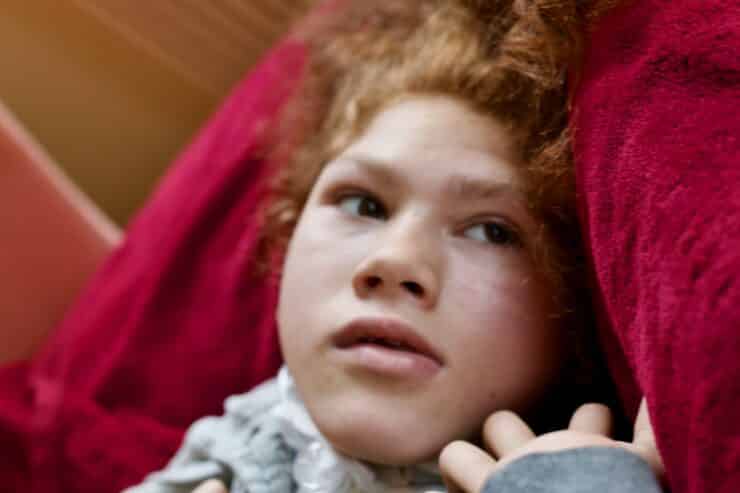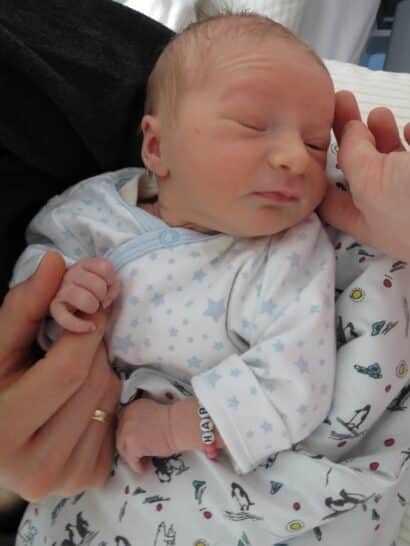Puberty is a time of change. The child turns into an adult, both physically and mentally. With the onset of sex hormone production, the adolescent body begins to change.
Course of Puberty
During puberty, secondary sexual characteristics develop. These include sex-specific body hair and body proportions, breast development and menstruation in girls, and voice change and prominence of the larynx in boys. Growth spurts also occur, and the numerous physical and hormonal changes are accompanied by emotional ups and downs.
In girls, breast development and pubic hair growth begin (thelarche and pubarche), the vagina and uterus mature and the first menstrual period occurs (menarche). This usually happens two to three years after the onset of puberty.
In boys, testicular volume increases, and the penis, muscle mass, and male-pattern body hair begin to grow. The first (nocturnal) ejaculations occur, as well as voice change.
The timing of puberty depends not only on genetic factors but also on numerous additional influences, such as general health, nutritional status, and emotional stress. On average, puberty begins at around 11 years of age in girls and 13 years in boys.
Precocious Puberty (pubertas praecox)
Precocious puberty is defined as the development of external sexual characteristics before the age of 8 in girls and before the age of 9 in boys.
Delayed Puberty (pubertas tarda)
Delayed puberty is defined as the absence of any pubertal signs by age 13.5 in girls and by age 14 in boys.
Puberty in Children with Disabilities
Children with disabilities may enter puberty significantly early or late. But even if puberty occurs on time, it presents the caregivers with completely new challenges.
Additional aspects must now be considered, and new questions arise:
- Orthopedic problems such as scoliosis may worsen during growth spurts.
- Existing symptoms may change. For example, epileptic seizures may become more or less frequent.
- Should the child be vaccinated against HPV?
- Should menstruation in girls be medically suppressed or regulated?
- What are the appropriate methods of contraception (also in the context of cycle regulation)?
- What hygiene measures are best during menstruation?
- Could menstrual pain be a source of irritability?
- Should the genital area be shaved?
- Does the child feel uncomfortable if a caregiver of the opposite sex assists with intimate hygiene?
- How does my now (almost) adult child wish to be treated—with regard to clothing style, communication, and so on?
This list is not exhaustive. Rather, it is intended to encourage reflection on these issues and to prompt further inquiry and research.
Resources
The first point of contact for medical questions about puberty is a pediatrician. For more specific concerns, specialists in gynecology or urology may be consulted. Regarding caregiving and emotional aspects of puberty, the experiences of other parents of children with disabilities can be valuable (e.g., in forums or through personal exchange).
At Eye Level
Puberty represents a profound change in the lives of young people. Healthy youths emerge from puberty almost as young adults. Children with PCH2, however, continue to require assistance and care, and remain dependent on caregiver decisions. It is therefore essential for all individuals involved in the care of these young people to approach them at eye level and to respect, encourage, and support their autonomy to the greatest extent possible.
Scientific Background
Data From Literature
Hypoplastic male genitalia and undescended testes (maldescensus testis) have been reported in association with PCH in multiple publications (Hashimoto et al. 1998; Grellner et al. 2000; Anderson et al. 2011).
Natural History Study from 2014
Due to limited data for this study, few conclusions could be drawn regarding the course of puberty. Two girls were reported to have markedly precocious puberty (at the ages of 6 years and 2 years). Among boys, undescended testes were observed in 8 of 10 cases. One child presented with hypoplastic male genitalia.
Natural History Study from 2023
In total, data on puberty was available for 52 children. Of these, twelve were already twelve or more years old.
With regard to precocious puberty, cryptorchidism (undescended testes), or increased epileptic seizures before puberty, 69.2% of the children showed no abnormalities.
Of the 26 boys, 42.5% had cryptorchidism.
Of the 15 children aged 12 years or older, 33.3% experienced an increase in epileptic seizures during puberty.
Precocious puberty was observed in 3.8% of cases (boys before age 9, girls before age 8).
Delayed puberty was documented in only one case, which involved a severely dystrophic (undernourished) child whose weight at the time of evaluation was below the 3rd percentile for PCH2.In free-text responses, several parents reported menstrual cramps in their daughters; in one case, the child’s irritability improved after the completion of puberty.
This entry was written to the best of our knowledge based on the reported experiences of parents of affected children. In addition, currently available data from the 2014 and 2023 Natural History Studies of PCH2 and from general medical literature has been included. It is not a substitute for consulting a medical professional. The author assumes no liability in this respect.
- Anderson C, Davies J H, Lamont L, Foulds N (2011) Early pontocerebellar hypoplasia with vanishing testes: A new syndrome? Am J Med Genet A 155A(4): 667-672
- Grellner W, Rohdeb K, Wilskea J (2000) Fatal outcome in a case of pontocerebellar hypoplasia type 2. Forensic Sci Int 113: 165-172
- Hashimoto K, Takeuchi Y, Kida Y, Hasegawa H, Kantake M, Sasaki A, Asanuma K, Isumi H, Takashima S (1998) Three siblings of fatal infantile encephalopathy with olivopontocerebellar hypoplasia and microcephaly. Brain Dev 20: 169-174
- Natural History Study von 2014: Frölich S. Natürlicher Verlauf der Pontocerebellären Hypoplasie Typ 2 [Inauguraldissertation zur Erlangung des Doktorgrades der Medizin] Tübingen: Eberhard-Karls-Universität; 2014
- Natural History Study von 2023: Kuhn A L. Gastrointestinale Symptome, Ernährung und Gedeihen bei Pontocerebellärer Hypoplasie Typ 2 A [Inauguraldissertation zur Erlangung des Doktorgrades der Medizin] Freiburg im Breisgau: Albert-Ludwigs-Universität; 2023


